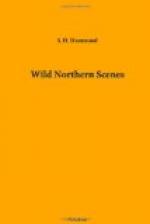CHAPTER XVI.
ROUND POND—THE PILE DRIVER—A THEORY FOR SPIRITUALISTS.
We put up our tents the next evening, on a bold bluff near the outlet of Round Pond, a picturesque and pleasant sheet of water, some eight or ten miles in circumference. It lay there still and waveless, in that calm summer evening, as glassy and smooth as if no breeze had ever stirred its surface. All around it were old forests, old hills and rocks, and away off in the distance were the tall peaks of the Adirondacks, standing up grim, solemn, and shadowy in the distance. These peaks are seen from almost every direction. They tower so far above the surrounding highlands, that they seem always to be peering over the intervening ranges, as if holding an everlasting watch over the broad wilderness beneath them. This lake is probably more than a thousand feet above the Rackett, and the river falls that distance principally at the two rapids around which our boats were carried. The rest of the way it is a deep, sluggish stream, so that the descent may be reckoned within less than three miles. A ledge of rocks forms the lower boundary of the lake, through which the water, at some remote period, broke its way, and it goes roaring down rapids for three-quarters of a mile, then moves in a sluggish current across a plain of several miles in extent; then plunges down a steep descent for over a mile and a half to subside again into quiet, and move on with a sluggish current to plunge down the ledges again into Tupper’s Lake. There are no perpendicular falls of more than twenty feet, but the water goes plunging, and boiling, and foaming down shelving rocks, and eddying, and whirling around immense boulders, rushing and roaring through the gorges with a voice like thunder. These falls are all useless here, and probably will be for centuries to come; but were they out in the “living world,” in the midst of civilization, with a fertile and populous region about them, they would soon be harnessed to great wheels, and made utilitarian; the clank of machinery would soon be heard above the roar of their waters. They would do an immensity of labor on their returnless journey to the ocean. But here, they are utterly valueless, wasting their mighty power upon desolate rocks, rushing in mad and impotent fury forever through a region of barrenness and sterility, so far as the uses of civilization are concerned, a region where the manufacturer or the agriculturist will never tarry, until the world shall be so full of people that necessity will drive them to the mountains, to build up the waste places of the earth. Opposite, and across the bay from where our tents were pitched, I noticed that a small stream entered the lake, and Smith and myself crossed over to experiment among the trout I knew would be gathered there. We were entirely successful, for we took one at almost every throw. I have more than once stated, that the trout of these lakes and rivers, in the warm season, congregate where the cold streams enter; and if the sportsman will search out the little brooks, no matter how small, and cast his fly across where their waters enter the lake or river, he will be sure to find trout in any of the hot summer months.




